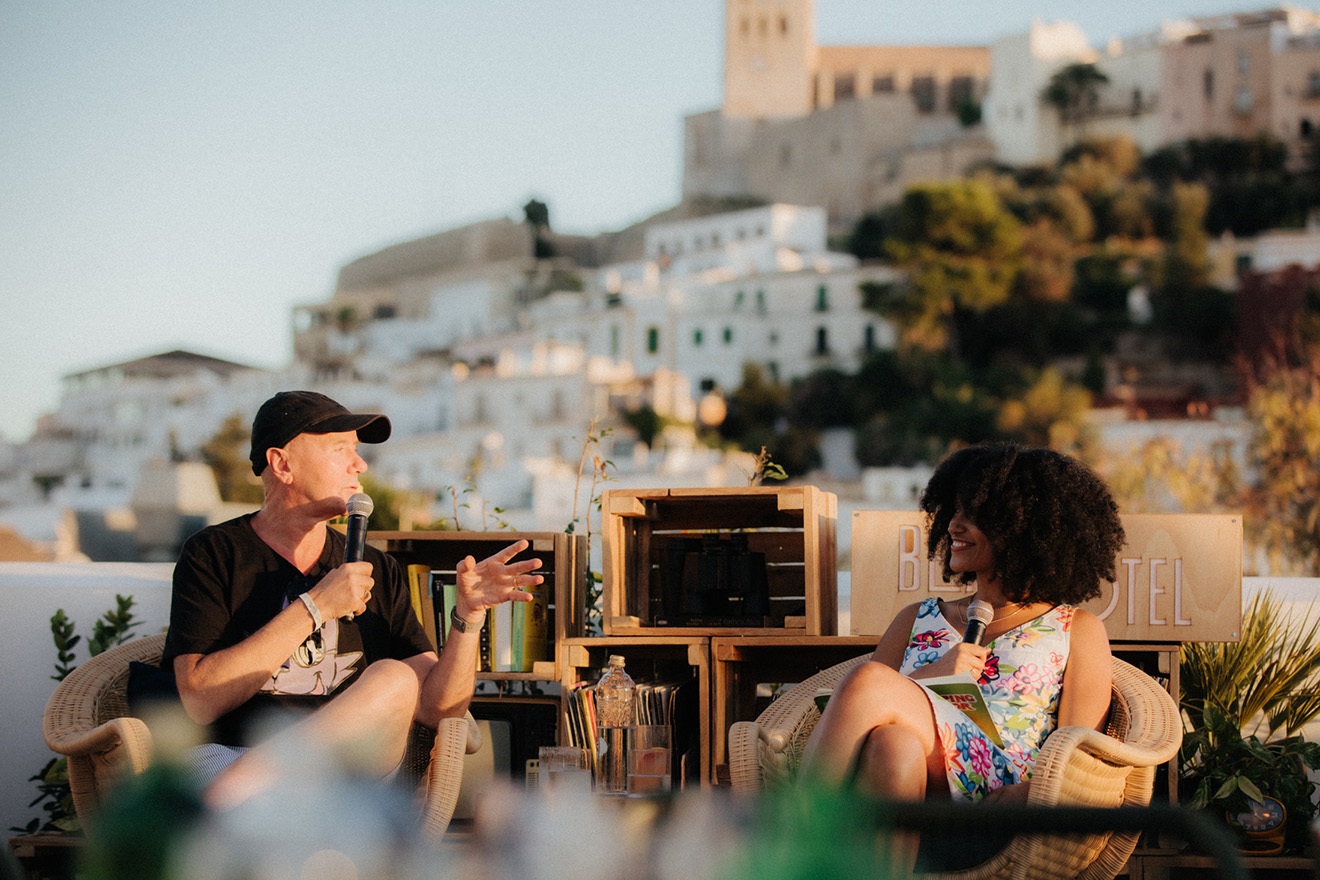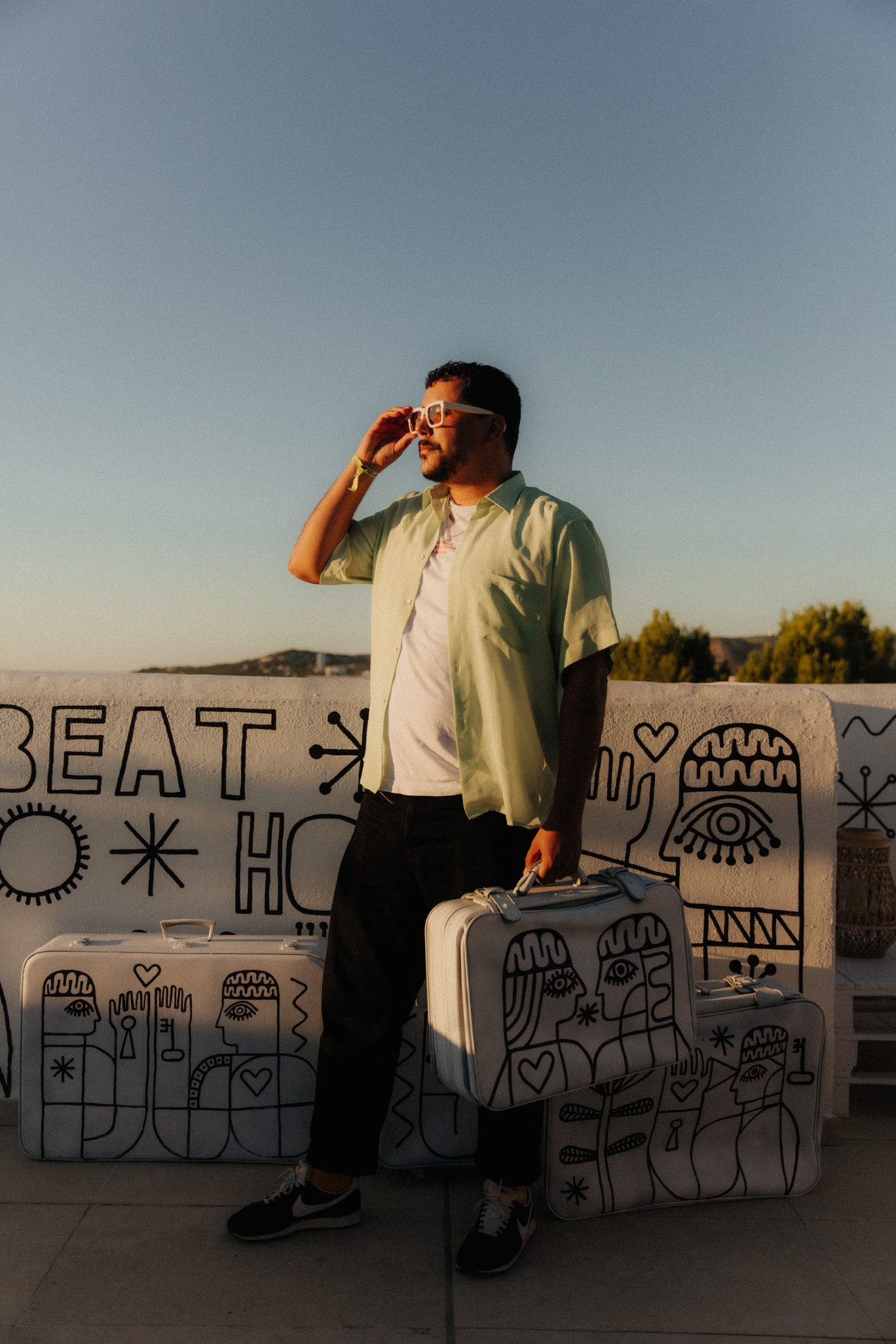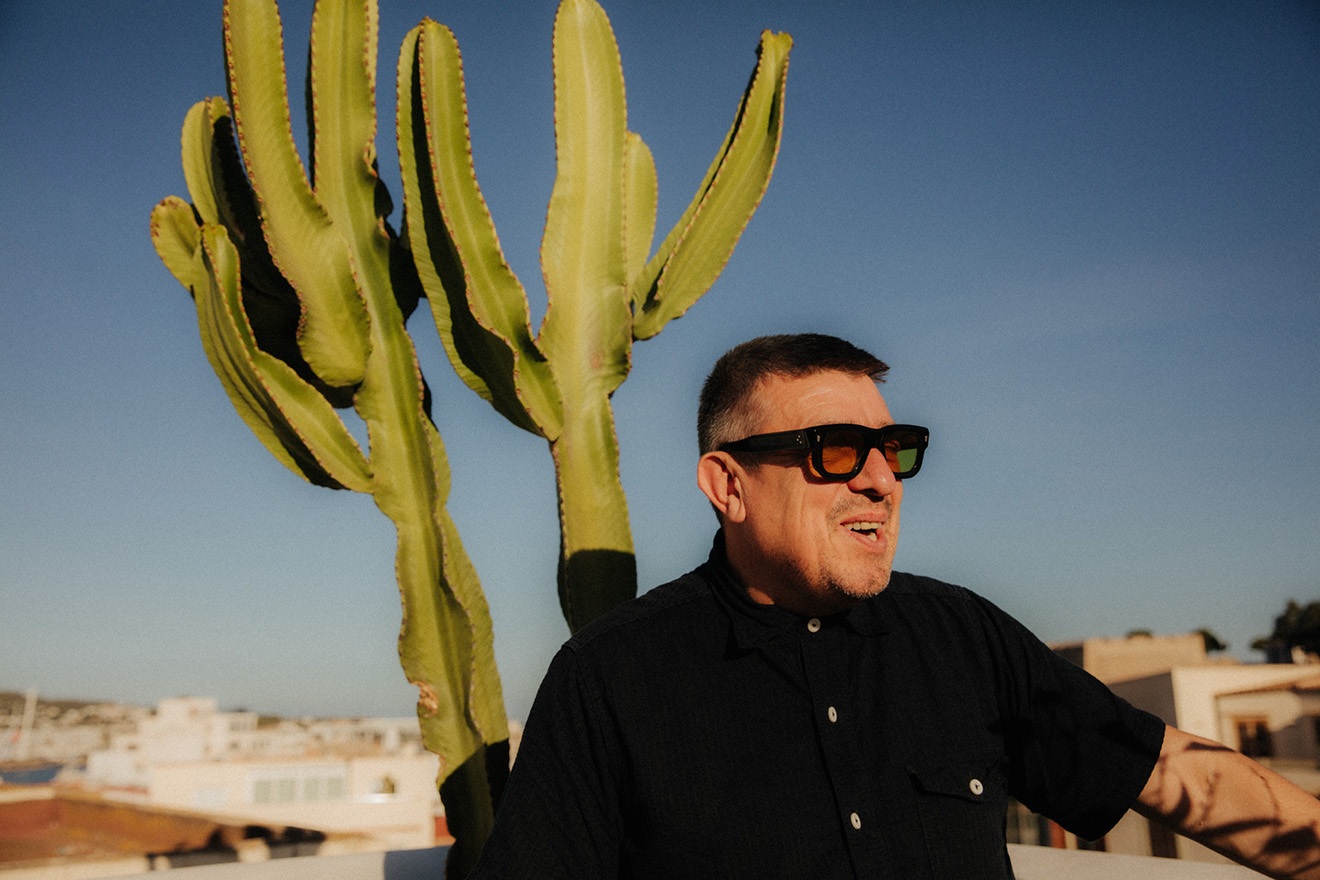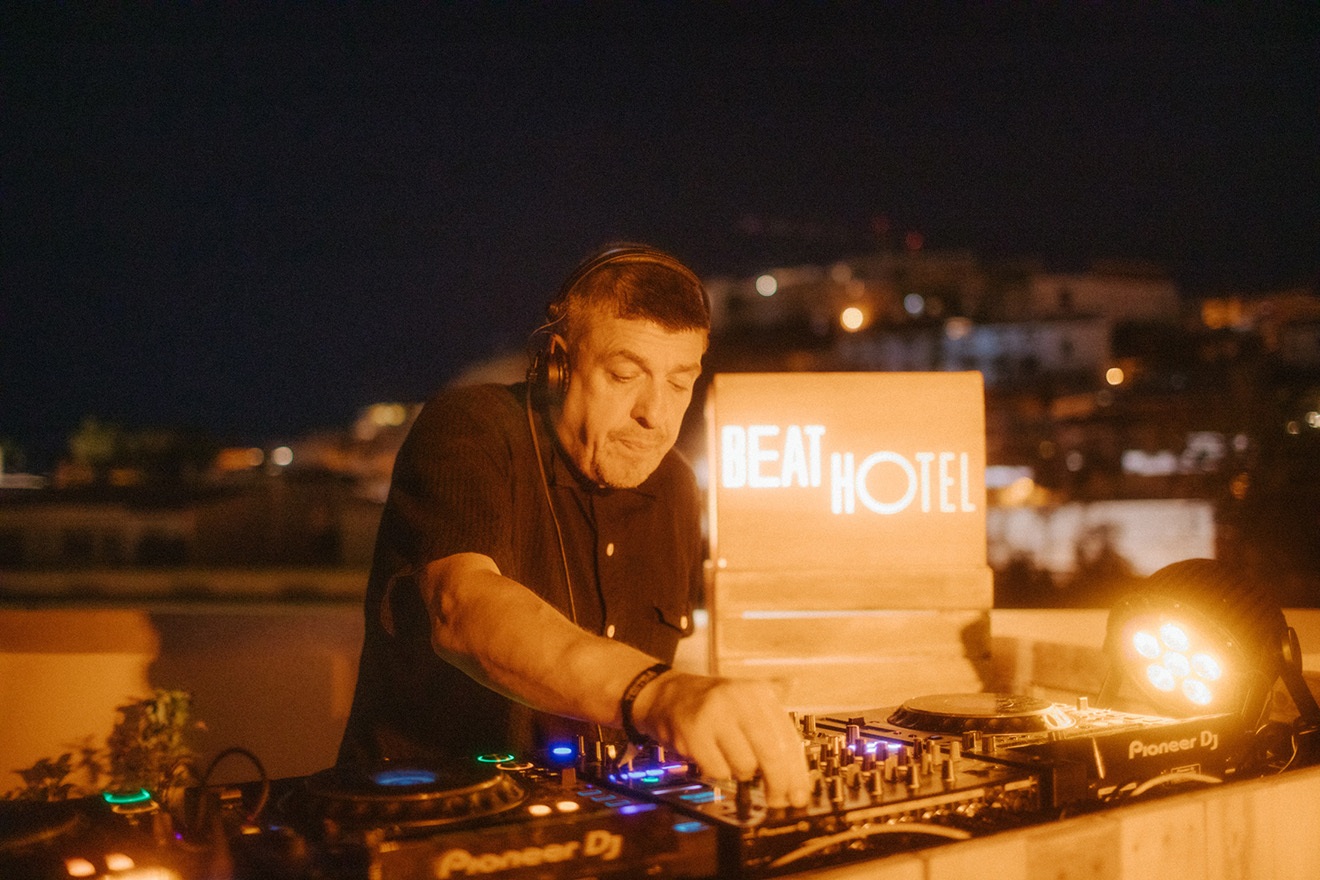 Features
Features
Beat Hotel is curating a Balearic paradise outside of Ibiza's superclubs
Ralph Moore travels to Ibiza to rediscover the original Balearic spirit and ethos of the island at Beat Hotel's third annual weekender
“Balearic is the essence of the island and where it comes from. It started much, much earlier, but it’s what made the island and then propelled it to the world.”
This quote comes from Camilo Miranda, one of the resident DJs at Pikes who has lived on the island for the best part of his adult life. But to a casual observer, it would be easy to surmise that Ibiza has given up on its original Balearic dream, or “essence”, as Camilo aptly describes it. Where Mixmag is staying in San Antonio (Las Mimosas in Cala de Bou) is unquestionably a beautiful hotel haven in the sun but walk down to the main strip 20 minutes away and, even in September, you’re faced with an onslaught of holidaymakers casually drinking pints of lager at 11:AM. And that’s before you reach Ocean Beach, the infamous 900-capacity day club run by Gary Lineker’s older brother Wayne — the less said about that the better. Things do improve once you’re past Eden and Es Paradis, as further along the strip you’ll find Café Del Mar and the ever-popular Café Mambo, a perennial sunset stop for British tourists for the best part of 25 years: Defected run a weekly party there (tonight’s guests when I swing by: Sam Divine and Low Steppa) and during peak season you can catch superstar DJs from Mousse T to Fatboy Slim performing before their main sets at Glitterbox, Pacha and Ushuaïa. So some of that essence appears intact, but is it slipping away?
Read this next: Does hippy Ibiza actually still exist?
Fret not, because Beat Hotel are working hard to preserve it with their annual Balearic retreat. This is their third year on the island - and frankly, it shows. For starters, the curation over their weeklong, multi-venue musical and wellbeing takeover is top notch (and if we stopped to talk about chef Richard Turner’s amazing BBQ, we’ll never get to the Balearia boat). Featuring a line-up of DJs and tastemakers who rarely visit Ibiza (and some visiting for the very first time), there are parties at Pikes, Cova Santa, Akasha and perhaps best of all, Luke Una playing classic cuts from Massive Attack and Alex Kassian on the roof at The Standard, following on from an erudite and open-minded musical conversation between Trainspotting author Irvine Welsh and NTS presenter and DJ Zakia. Irvine’s anecdotes are a riot. “It was such a pleasure to chat with Irvine: he's a legend and extremely down-to-earth which made my job easy and he has stories for days,” Zakia tells us after the event. “When I first played Beat Hotel, the island was still feeling its way out of lockdown, so it was beautiful to experience it in full swing this year. It’s a new manifestation of the long-established tradition of Balearic revelry on the island.”

The night after, Cova Santa – a venue arguably more in tune with Woomoon’s melodic Tuluminati sound – features former Mixmag cover star Sofia Kourtesis playing live (a thing of beauty, especially ‘La Perla’ and ‘Estacion Esperanza’) as well as DJ sets from Gabrielle Kwarteng, Raw Silk, Perel and Talaboman and. as night turns slowly to day, another former Mixmag cover star, Daniel Avery. And that’s before we get to the poolside sounds back at base camp at Las Mimosas, which cover the whole Balearic house spectrum, from Worldwide FM’s Mexican breakfast host Coco Maria and Swedish house star Axel Boman (who ends his set with Andrea Bocelli’s ‘Time To Say Goodbye’) to Dan Beaumont and the righteous DJ/producer Alex Kassian. All without having to step out of your hotel comfort zone.
Now a full-blown Balearic island resident, the first DJ we talk to at Las Mimosas is quote machine Camilo, who says his family had a very nomadic lifestyle as a child. Immersing himself in the White Isle’s synth sound via his new spiritual home of Pikes, Camilo’s island observations resonate acutely. “We travelled a lot between France and Brazil [where his parents were from] and would come here sometimes,” he says of his idyllic childhood. “My earliest memory of Ibiza is being on Sa Trincha beach aged four, probably listening to Jon Sa Trincha! We moved here in ‘98 and my parents took over KM5, so I went to school and grew up here. I always liked music but when I was 15, I took all the equipment from the basement [of KM5] and put it all in my bedroom because my father was not using them. I started playing psytrance in the raves here! Totally different to the big clubs, but there was a big community. And then I grew up and started looking to other genres.”
Read this next: The history of Ibiza in 100 tracks
Momentarily, the Miranda family returned to Brazil to open another restaurant and Camilo had to choose between becoming a painter via art school or becoming a DJ full-time. “When I came back here, I was working as a waiter but I realised I wanted to DJ professionally, and as soon as I made that decision I started to DJ a little bit everywhere and got a residency at Pikes. DJ Harvey was doing a party every Monday called Mercury Rising and when I went, it totally blew my mind and I found the music and the community I was looking for.”
Is DJ Harvey his spirit animal? He laughs. “I wouldn’t go that far but we have become very good friends! I started to DJ at Pikes and organically became his guy on the island. He made a proposition to me: ‘you drive and I play”. So I got to go to all the nice restaurants with him and now I do a lot of daytime things, mostly at Pikes.” I ask him to describe his own sound. “It goes around, and it’s all orbiting Balearic,” he replies, warming to the topic. “But there is a misconception of Balearic: it’s not necessarily downtempo or chill out, it started in the clubs and then became something that people play at sunset. But yes, Pikes is the best.”

So the spirit of Balearic isn’t dormant: you just need to look a little harder than the main dancefloor of the commercial super clubs. One of the best places on the island for sunset is Hostal La Torre and on Thursday afternoon, Mixmag sits down in person with one of their regulars (not to mention another Pikes mainstay), the irrepressible DJ and raconteur Luke Unabomber and unsurprisingly, he’s a joy and delight to converse with. He tells me to “listen without prejudice” several times during our conversation and he remains as evangelical about electronic music as he’s ever been. (He’s also unquestionably a man of the people, and after bouncing back to London in the morning to play fabric, he’s last seen jumping on the Megabus up to Manchester because of the national train strike.)
Luke Unabomber is one of the UK’s most precious selectors, but he’s far from an overnight success. Like Camilo, he has a very unique perspective and that’s down to decades at the coalface of club culture. “I first played for Beat Hotel in Morocco at a mad little house on the edge of the desert,” he remembers. “It was an amazing festival with great music and great food, and what I like is they are really taking their time and doing something different. Not to put on a generic 150 BPM Euro white trash tech-house on a Romford fairground, they are really making an effort here.” Fans of Homobloc and Homoelectric will know that Luke has worked tirelessly behind the scenes for many years in Manchester. Is it hard for a brand like that to keep its integrity as it continues to grow? “Yes, of course it is! For years, I ran all these things and we had a team but I was the boss - but I do things differently now. Maybe I used to believe the old adage that a camel is a horse made by committee: far too much procrastination for things getting done, but over the past five years I feel different. For instance, with Homobloc I have been working with Rod Connolly, who loves live music and in some ways was a rival on the gay scene back in the day running different nights. But he is now part of the team and a leading member and he’s added to the pot. So without being too Gandhi, you can change the way you do things. Turning the pub into an old school squat with a punk attitude and the bookings like Peaches and Jessie Ware have really elevated what we do. You can teach an old dog new tricks!”
Watch: Luke Una in The Lab LDN
Luke started his career at events like the much-missed Electric Chair in Manchester (which finally closed after 13 years back in 2008) and his laser-focus on quality club cuts has never faltered: an example of the kind of record he always championed back in the day was King Britt’s spine-tingling remix of Josh One ‘Contemplation’ and over lockdown he furiously championed what he calls ‘É Soul’, which includes records like the Morales Lunar Dub mix of ‘Stay This Way’ by the Brand New Heavies, first released via London Records in 1992 as well as the dreamy ‘Le Train’ by Chene Noir. “Acid house blew the doors off of purism which I saw on the soul scene,” he remembers. “I still buy soul records and I still spend most of my money on expensive records, but I also love bargain bin bombs. Listen without prejudice should be the mantra because people get too bothered about where it comes from.” He cites a recently discovered remix of ‘Break 4 Love’ by Raze (the Skunk mix) - a record he’s played religiously for the past four years - as the kind of cut he loves: “and it never stops.”
His evangelical attitude to music increased exponentially over lockdown. And he recently released the second of two instalments of a vinyl series called ‘É Soul Cultura’ via Mr Bongo. The template is the same as on the radio: digging in the crates and through Bandcamp and sharing music with both a new and established audience. “What I love about compilations is that you are telling a story in the way you made a tape in the ‘80s and there is a golden thread: people buy into that. A friend of mine, [the Mancunian writer] John McCready, said when it comes to records, ‘you do realize we’re just hiring them?’ Then I got to this point, where I also realized all of these things are borrowed - even the cheap records, you’re just borrowing them! So there’s no point in having a completist pile, you may as well share them. I had a moment during COVID and loved the sharing on Worldwide FM. And it’s infinite! The other part is there is so much music coming out all the time and a compilation is one of the ways to get a sense of people’s collections.”


Luke’s career is in an amazing place as we head into 2024, but he’s quick to point out that there is no grand master plan to his own growing status in the European underground. “It’s serendipity. There wasn’t a master plan. The wind in my sails was probably COVID. While it was obviously a tragedy, there was a cultural reset and I have been doing events, running bars as well as a restaurant but my own reset was “momento mori”, you don’t live forever and I went back to music in a much more involved way. And it was the perfect storm and that propelled me into lots of areas. I have bought records and loved music forever but post-COVID, things took a turn and COVID changed the algorithm slightly with the way people listen to music. And I am going with it! I stopped drinking and my life changed a lot. I am very old school. You don’t have to believe in capitalism or read the Daily Mail to be a grafter. I do get up very early these days. The last few years have been very rewarding. I came back to being creative.”
And with that, Luke is off to chat to friends, fans and colleagues at The Standard, including DJ Pippi and Irvine Welsh. Later, he comes on to DJ after a live set from Italian composer Gigi Masin, who’s flown in from Venice: wherever you look, there are musical kindred spirits from across Europe. It’s all very refreshing. So: the island is changing, albeit slowly and at around 125 BPM rather than 160 BPM via the main dancefloor at Hï Ibiza. Beat Hotel’s third year on the white isle has been a bona fide musical delight and from Austin Ato’s ‘When Love Is Tender’ to that Skunk mix of ‘Break 4 Love’ by Raze (which also got a further play poolside: it’s a jam!), I genuinely can’t remember the last time I came home with so many new tunes in my arsenal: that’s a dream in itself. To close out, Pikes resident Camilo Miranda sums up the new spirit of optimism away from the tattoo sleeves and tech-house mafia. “San Antonio is changing,” he says. “In the next 5-10 years there will be more hotels like this and more spaces to develop the new Balearic generation that’s coming.” As ever, we can but hope.
Ralph Moore is Mixmag's Music Editor-at-Large, follow him on Twitter


